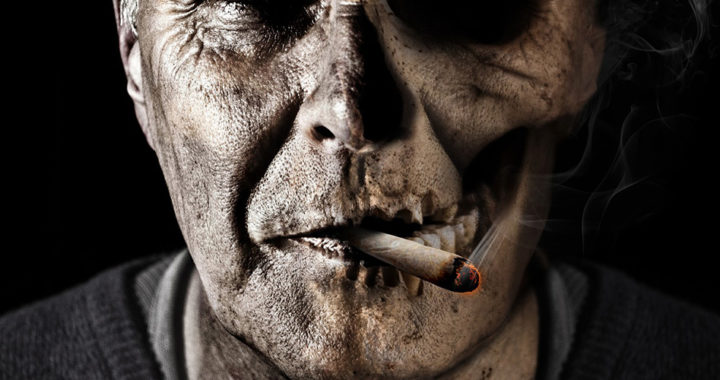As if there are not enough reasons not to smoke, especially considering its negative health effects to include increased risk for developing cancers and cardiovascular diseases, smoking also has undesirable effects on the skin.
Lighting a tobacco or a cigarette can essentially ruin the skin. Prolonged smoking leads to premature skin aging and development of skin diseases. But how exactly smoking affects the skin? Several studies have investigated and explained how tobacco smoking damages the skin and negatively affects skin health.
Explainer: The Effects of Tobacco Smoking on Skin Health
Smoking Affects the Synthesis of Collagen and Degrades the Skin
The study of A. Knuutinen et al. revealed that smoking decreases the synthesis of Type I and Type III collagen by 18 percent and 22 percent respectively. Take note that collagen is a structural protein present in fibrous tissues such as tendons, ligaments, and skin.
A more specific review study by A. Morita noted that chemicals in tobacco increase the production of a group of enzymes called matrix metalloproteinases that are responsible for breaking down most extracellular matrix proteins, thereby degrading collagen, elastic fibers, and proteoglycans.
Hence, with regard to skin health, a low collagen level affects the ability of the skin to regenerate. The capacity of the body to synthesize and produce new collagen naturally decreases with age. However, smoking accelerates this natural timeline, thus causing premature skin aging as demonstrated by the appearance of sagging skin, wrinkles, and fine lines due to reduced ability to regenerate and reduced elasticity.
Smoking Affects Wound Healing Process and Hampers Skin Repair
Aside from the fact that smoking affects how the body synthesizes collagen, specific chemicals in tobacco slow down the natural wound healing process, thus hampering skin repair. These chemicals are nicotine, carbon monoxide, and hydrogen cyanide.
Researcher P. Silverstein reviewed the literature related to the aforementioned. He explained that nicotine is a vasoconstrictor or an agent that narrows the blood vessels, thus reducing nutritional blood flow to the skin and resulting in tissue ischemia and impaired tissue repair. It also increases the adhesiveness of platelets, thus increasing tissue ischemia.
Carbon monoxide also affects blood circulation and the delivery of nutrition to the skin as it diminishes the transportation and metabolism of oxygen. On the other hand, hydrogen cyanide constrains the enzyme systems that are required for cellular oxidative metabolism and oxygen transport. Essentially, these chemicals deprive the skin of oxygen and nutrients needed for repair and regeneration.
Smoking Affects Skin Tone and Complexion in Several Ways
The fact that smoking impairs blood flow to the skin, particularly the delivery of nutrients, in addition to the fact that it reduces the production of red blood cells can result in a dull skin tone and unhealthy complexion.
H. Cho et al. investigated changes in skin color after smoking cessation by following a sample of 49 men for four months. Using melanin index and erythema index, findings revealed that after the investigation period, the skin color of the group of participants who ceased smoking became significantly lighter.
The review part of the same study by Cho et al. noted that nicotine has been hypothesized to stimulate melanocyte activity and melanin production, thus resulting in the darkening of the skin. Furthermore, it explained that the non-melanin pigment hemoglobin contributes to skin color. Smoking reduces the hemoglobin content of the skin.
Smoking Affects the Development of Inflammation and Autoimmune Diseases
Cho et al. also mentioned that tobacco smoking has been correlated with the development of numerous dermatological conditions such as dermatitis or eczema, psoriasis, systemic lupus erythematosus, and hidradenitis suppurativa. Note that these conditions are related to abnormal inflammatory response of the immune system, as well as autoimmune responses.
The study A. Hosseinzadeh et al. showed that nicotine activates immune cells called neutrophils that in turn, release molecules that trigger inflammation. A review study by J. Lee, V. Taneja, and R. Vassalo noted that burning tobacco produces thousands of reactive oxidative substances that generate more free radicals, activate oxidative-sensitive cellular pathways, and induce DNA damage, that in turn, trigger inflammation both at molecular and cellular levels. Chronic inflammation due to smoking leads to dysfunction in immune response, specifically abnormal inflammation and the development of autoimmune responses.
Inflammation and autoimmune diseases vary and affect the body in numerous ways. In terms of skin health, a group of diseases called dermatitis or eczema are generally described as the inflammation of the skin due to an immune reaction. Moreover, specific diseases such as psoriasis and systemic lupus erythematosus are typically defined as autoimmune diseases in which the immune system abnormally attacks normal body parts.
FURTHER READINGS AND REFERENCES
- Cho, Y. H., Jeong, D. W., Seo, S. H., Lee, S. Y., Choi, E. J., Kim, Y. J., Lee, J. G., Lee, Y. H., Bae, M. J., and Chin, H. W. 2012. Changes in Skin Color After Smoking Cessation. Korean Journal of Family Medicine. 33(2): 105-109. DOI: 4082/kjfm.2012.33.2.105
- Hosseinzadeh, A., Thompson, P. R., Segal, B. H., and Urban, C. F. 2016. Nicotine Induces Neutrophil Extracellular Traps. Journal of Leukocyte Biology. 100(5): 1105. DOI: 1189/jlb.3AB0815-379RR
- Knuutinen, A., Kokkonen, N, Risteli, J., Vähäkangas, J, Kallioinen, M, Salo, T., Sorsa, T., and Oikarinen, A. 2002. Smoking Affects Collagen Synthesis and Extracellular Matrix Turnover in Human Skin. The British Journal of Dermatology. 146(4): 588-94. DOI: 1046/j.1365-2133.2002.04694.x
- Lee, J., Taneja, V., and Vassalo, R. 2012. Cigarette Smoke and Inflammation: Cellular and Molecular Mechanisms. Journal of Dental Research. 91(2): 142-149. DOI: 1177/0022034511421200
- Morita, A. Tobacco Smoke Causes Premature Skin Aging. Journal of Dermatological Science. 48(3): 169-175. DOI: 1016/j.jdermsci.2007.06.015
- Silverstein, P. 1992. Smoking and Wound Healing. The American Journal of Medicine. 93(1A): 22S-24S. DOI: 1016/0002-9343(92)90623-J

